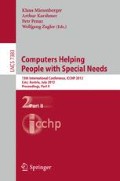Abstract
Alphabetical-based message generating method is one of the essential features for an augmentative and alternative communication (AAC) system, although it is not the most efficient method. For the Mandarin Chinese AAC users, Chinese text entry is very important if they are expected to say what they want to say. However, a user is required to assemble specific keys to generate a Chinese character. Users need to learn a specific text entry method before they could generate any Chinese character. This study aims to develop a web-based training system which comprises the core Chinese characters to assist the individual with disabilities to learn to generate Mandarin Chinese message more efficiently. This study conducted a usability evaluation to exam the system. In addition this paper also recruited children with learning disabilities and mental retardation to test the training system.
Access this chapter
Tax calculation will be finalised at checkout
Purchases are for personal use only
Preview
Unable to display preview. Download preview PDF.
References
American Speech-Language-Hearing Association.:Preferred Practice Patterns for the Profession of Speech-Language Pathology (PreferredPractice Patterns) (2004), http://www.asha.org/docs/html/PP2004-00191.html
Hill, K., Baker, B., Romich, B.: Augmentative and Alternative Communication (AAC) Technology. In: Cooper, R., Ohnabe, H., Hobson, D. (eds.) Introduction to Rehabilitation Engineering, pp. 355–384. Institute of Physics Publishing, London (2007)
Chen, M.C., Wang, H.P., Li, T.Y.: Teaching Adolescents with Disabilities to Learn Chinese Keyboarding by Using Multimedia Computer Assisted Input Method Learning System. In: Miesenberger, K., Klaus, J., Zagler, W. (eds.) ICCHP 2002. LNCS, vol. 2398, pp. 271–272. Springer, Heidelberg (2002)
Chen, M.C., Hill, K.: Redesign of a keyboard layout for enhancing the proficiency of text-entry for single digit Mandarin Chinese Users. Post at Clinical AAC Research Conference. Charlottesvill, VA, USA (September 2008)
Balandin, S., Iacono, T.: Crews, Wusses, and whoppas: Core and fringe vocabularies of Australian meal-break conversations in the workplace. Augmentative and Alternative Communication 15, 95–109 (1999)
Stuart, S., Beukelman, D.R., King, J.: Vocabulary use during extendedconversations by two cohorts of older adults. Augmentative and Alternative Communication 13, 40–47 (1997)
Author information
Authors and Affiliations
Editor information
Editors and Affiliations
Rights and permissions
Copyright information
© 2012 Springer-Verlag Berlin Heidelberg
About this paper
Cite this paper
Chen, MC., Chen, CC., Ko, CC., Wang, HP., Chen, SW. (2012). Developing AAC Message Generating Training System Based on Core Vocabulary Approach. In: Miesenberger, K., Karshmer, A., Penaz, P., Zagler, W. (eds) Computers Helping People with Special Needs. ICCHP 2012. Lecture Notes in Computer Science, vol 7383. Springer, Berlin, Heidelberg. https://doi.org/10.1007/978-3-642-31534-3_44
Download citation
DOI: https://doi.org/10.1007/978-3-642-31534-3_44
Publisher Name: Springer, Berlin, Heidelberg
Print ISBN: 978-3-642-31533-6
Online ISBN: 978-3-642-31534-3
eBook Packages: Computer ScienceComputer Science (R0)

